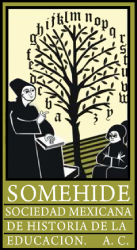Language of the state and the history of education: Two deflections in devising free textbooks and fundamental education as objects of study
DOI:
https://doi.org/10.29351/amhe.v4i1.616Keywords:
Fundamental education, language of the state, free textbooks, methodology, object of studyAbstract
This paper explores the consequences of critically examining the conventional notion of state in the history of education, specifically at the methodological level when defining our object of study. This critique destabilizes the state as a coherent and unified entity, evidencing that said image is partially a result of a language that constitutes it as such. This work proposes a contrasting exercise in conceiving an object of study depending on whether the research is influenced by such language of state. The counterpoint is illustrated through vignettes from two Master degree’s theses: one addressing the case of free textbooks from the first generation as citizenship formation devices, and the other dealing with the formulation of fundamental education under the auspices of an international organization during the postwar years. Through this examination, we assess some alternatives in the conception of both the processes conveyed and the multiplicity of their protagonists, thus diversifying the quality of the questions that could guide the research. Therefore, a point is made to consider the methodological effects that the language of the state can have on the historicization of education.
References
Abrams, P. (2015). Notas sobre la dificultad de estudiar el Estado. En P. Abrams, A. Gupta y T. Mitchell (eds.) Antropología del Estado (pp. 17-70). Fondo de Cultura Económica.
Boel, J. (2016). UNESCO’s Fundamental Education Program, 1946-1958: Vision, actions and impact. En P. Duedahl (ed.) A history of UNESCO: Global actions and impacts (pp. 153-167). Palgrave Macmillan.
Chambers, M. (2016). Fundamental Education: UNESCO and American post-war Modernism. Transatlantica. Revue d’études Américaines. American Studies Journal, 1, 1-12. https://doi.org/10.4000/transatlantica.8055
Chartier, A. M. (2002). Um dispositivo sem autor: cadernos e fichários na escola primaria. Revista Brasileira De História da Educação, 2(1[3]), 9-26. https://periodicos.uem.br/ojs/index.php/rbhe/article/view/38731
Civera, A. (2015). Entre lo local y lo global. La Unesco y el proyecto educativo piloto de México 1947-1951. Annali di Storia dell’Educazione e delle Istituzioni Scholastiche, 22, 165-179. https://www.torrossa.com/en/resources/an/4923927
Das, V., y Poole, D. (2008). "El estado y sus márgenes. Etnografías comparadas" en Anthropology in the Margins of the State, School of American Research Press, Santa Fe (NM), 2004. Relaciones Internacionales, (8), 1-39. https://doi.org/10.15366/relacionesinternacionales2008.8.008
Foucault, M. (1992). El orden del discurso. Tusquets.
Ixba, E. (2014). El estado mexicano: ¿artífice del libro de texto gratuito? Origen y hechura de la primera generación de los LTG (1959-1964) [Tesis doctoral, Centro de Investigaciones y Estudios Avanzados del Instituto Politécnico Nacional].
Lazarín Miranda, F. (2014). México, la UNESCO y el Proyecto de Educación Fundamental para América Latina, 1945-1951. Signos Históricos, 16(31), 89-115. http://www.scielo.org.mx/scielo.php?script=sci_arttext&pid=S1665-44202014000100003&lng=es&tlng=es
Loaeza, S. (1988). Clases medias y política en México: la querella escolar, 1959- 1963. El Colegio de México.
Matasci, D. (2020). Réformer l’Empire: Éducation de base et développement en Afrique coloniale française (1945-1956). Paedagogica Historica, 57(3), 228-245. https://doi.org/10.1080/00309230.2020.1793209
Vázquez, J. (1970). Nacionalismo y educación en México. El Colegio de México.
Verna, C. F. (2016). Haiti, the Rockefeller Foundation, and UNESCO’s Pilot Project in Fundamental Education, 1948-1953. Diplomatic History, 40(2), 269-295. https://doi.org/10.1093/dh/dhu075
Villa, L. (1988). Los libros de texto gratuitos. La disputa por la educación en México. Universidad de Guadalajara.
Downloads
Published
How to Cite
Issue
Section
License
Copyright (c) 2024 Alina Margarita Horta Méndez, Yasser Viliulfo Martínez Tapia

This work is licensed under a Creative Commons Attribution-NonCommercial 4.0 International License.
Todos los contenidos del Anuario Mexicano de Historia de la Educación se publican bajo una licencia Creative Commons Atribución No Comercial 4.0 Internacional (CC BY-NC 4.0), que permite compartir (copiar y redistribuir el material en cualquier medio o formato) y adaptar (remezclar, transformar y construir a partir del material) para fines no comerciales, dando los créditos a los autores y a la revista, tal como lo establece la licencia.
La política de acceso abierto y de licencias con “algunos derechos reservados” no niega la propiedad intelectual ni los derechos de los autores respecto a sus artículos, pues ellos son los titulares, en tanto que el Anuario Mexicano de Historia de la Educación no los reserva para sí ni para la institución editora, ya que se apegan a movimientos de acceso abierto como los Principios y Valores del Sistema de Información Científica Redalyc - Red de Revistas Científicas de América Latina y el Caribe, que pugnan por la eliminación de las políticas de embargo para que el autor retenga los derechos de su obra (principio número 8). Así como las políticas de acceso abierto del Directory of Open Access Journals (DOAJ).
Los autores podrán distribuir su propio material en cualquier otro medio o soporte, siempre y cuando sea para fines no comerciales, informando a los editores que el trabajo será publicado nuevamente y dando el crédito correspondiente al Anuario Mexicano de Historia de la Educación.
La publicación en el Anuario Mexicano de Historia de la Educación, por su carácter gratuito, no da derecho a remuneración económica alguna a los autores, ni a los dictaminadores.
Los lectores podrán reproducir (copiar), comunicar, distribuir o hacer obras derivadas de los artículos o colaboraciones publicados en el Anuario Mexicano de Historia de la Educación en los siguientes casos:
- Para fines públicos.
- Sin fines comerciales.
- Que se reconozca la autoría de la obra y se cite su origen con información completa: Apellido/s del autor, inicial/es del nombre/s. (año de publicación). Título del artículo. Nombre de la revista, volumen (número de ejemplar), página inicial del artículo-página final del artículo. DOI o URL (formato sugerido de acuerdo al estilo APA en su versión más reciente).
El cuerpo editorial del Anuario Mexicano de Historia de la Educación asumirá el compromiso de notificar oportunamente a los autores sobre cualquier cambio de ubicación de los artículos en el sitio (cambio de dirección URL o de conexiones para identificar el artículo).
Los autores, al enviar sus trabajos para su posible publicación, deberán tomar en cuenta los puntos anteriores, mismos que se contemplan en el Acuerdo entre autor y el Anuario Mexicano de Historia de la Educación.












